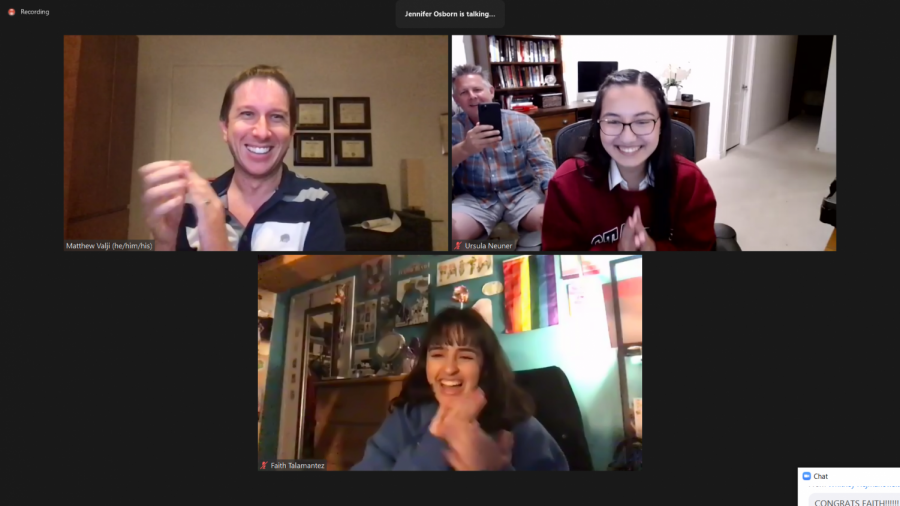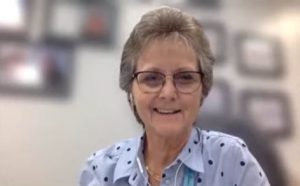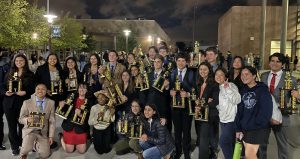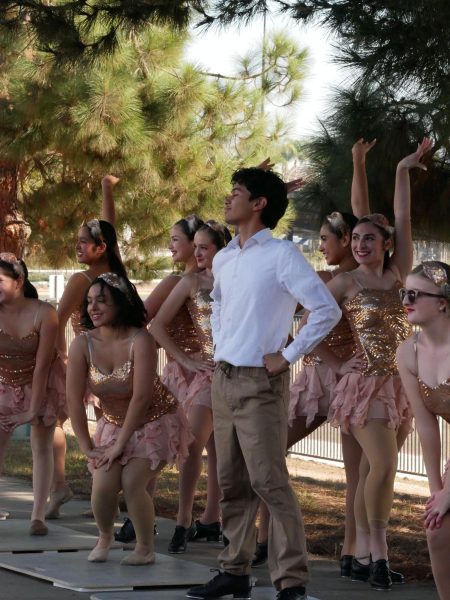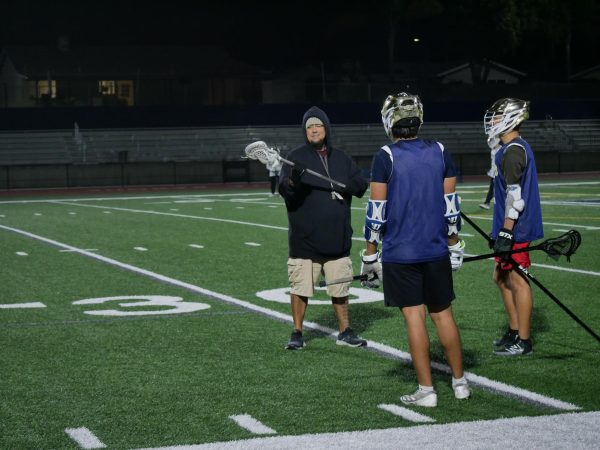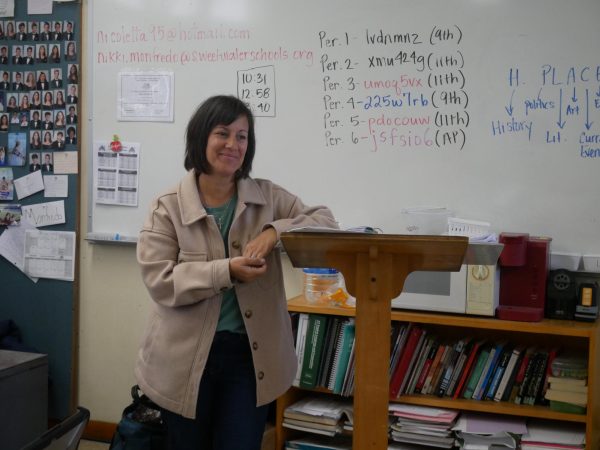Another win —and challenge— for BVH’s ‘mental athletes’
Speech and Debate team qualifies for state tournament
Seniors Faith Talamantez and Ursula Neuner win first place in the Public Forum event. They both qualified for the state tournament.
The California High School Speech Association (CHSAA) State Qualifying Tournaments for Speech and Debate came to a close on March 6. Students, coaches and parents attended the awards ceremony held on the video conferencing platform Zoom, where rankings were announced. Students sat anxiously in front of their laptops, awaiting their results, excited to see if all their hard work and preparation paid off.
Feb. 19 marked the start of the State Qualifier tournament for Bonita Vista High’s (BVH) Speech and Debate team, and by the end, 16 students qualified. Considering the status of the ongoing COVID-19 pandemic, the 2021 State Qualifying Tournaments were held online. Despite difficulties, they were able to end a successful year through each other’s accomplishments.
Speech and Debate Advisor and coach and International Baccalaureate English Literature HL 2 teacher Eric Helle did not know if he would have a team this year, considering the pandemic. He explained how it is challenging for students to be staring at a screen all weekend for Speech and Debate tournaments. Helle understands that it “is mentally and emotionally taxing.” He is impressed to see his “mental athletes” rise to the occasion.
“I was very happy that we had 16 different students qualify for the state tournament, especially considering the obstacles placed in front of us by the pandemic, distance learning and distance competitions. To equal the number of kids that we had qualified last year at a physical tournament; what a testimony to our school’s ability to persevere and compete at a high level,” Helle said.
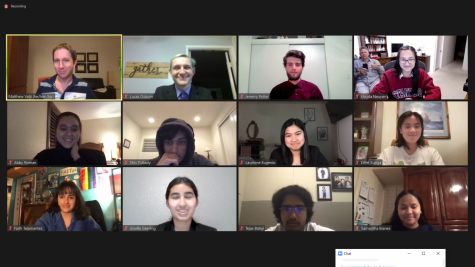
Furthermore, Speech and Debate President and senior Ursula Neuner mentioned that personally, qualifying in three out of the four events she participated in at the tournament was accompanied by a blend of emotions. According to Neuner, while she was ecstatic to hear she was able to progress to the state tournament, “it [was a] bittersweet moment” because it was her last league tournament as a graduating senior.
“I’ve been working on perfecting my craft in Speech and Debate for the past four years, so it felt really good to succeed. Individually, it’s nice to have a good final showing before I graduate; I was happy that I did well,” Neuner said.
Additionally, Speech and Debate state qualifier and sophomore Eiffel Sunga qualified in Public Forum (PF) at the competition, which is a partnered debate event where two teams debate a topic that they have researched beforehand. For her, it was fulfilling to compete against more experienced opponents and come out victorious. Moreover, progressing further into the competition compared to last year made this win much more special, Sunga said.
“[Qualifying is] very satisfying because all year, specifically in PF, I’ve put a lot of time, effort and research into all of our [arguments]. [It’s not always about winning, but being] able to qualify for [state in PF] and beat a bunch of teams [who are] considered good in the league is very satisfying,” Sunga said. “Last year, I remember we [Sunga and her debate partner] got knocked out in the third round, and this year [we] made it all the way to quarterfinals, which is a huge step for us.”
Speech and Debate Policy Captain and senior Gerardo Gonzalez Martinez wanted to end his year strong since it would be his last “hoorah” as a graduating senior. However, he was not able to qualify, but knowing that he contributed to other members’ success was already a win for him.
“I would say we [Gerardo and his debate partner] performed at a really high level consistently and this was the outlier, which is why it’s a bit disappointing that the outlying bad tournament was when it mattered most,” Gonzalez Martinez said.
In the days leading up to the tournament this past weekend on March 5 to 6, Neuner’s teammates were stressed due to the anxiety of not knowing how they would perform. In order to reassure them, she told them that constantly preparing for the competition would help calm them down.
“Everyone wants to perform well because everyone wants the opportunity to compete at the state tournament. As officers, our goal was to make sure that the [competitors] were really prepared so that they didn’t have to feel as stressed,” Neuner said. “I always think that action is the antidote to anxiety. [Work] can [ease] some stress because it makes you think ‘Oh, I am prepared.’”
For Sunga, nerves work to her advantage. She said that while her nerves can be overwhelming, she would rather choose to embrace them. Regardless of how daunting the competition might be, her built-up anxiety only makes her hungrier for success, Sunga explained.
“I think part of the reason why I like [Speech and Debate] is because of those nerves. I don’t push them away, [instead] I use them to increase my energy and be more enthusiastic in my rounds. It really propels me to do better,” Sunga said. “I’m nervous and I’m scared, but that’s all jumbled up with the huge feeling of excitement. I feel like that really fuels the fire in me.”
Despite the team’s success, Helle mentioned that there have been no benefits from online Speech and Debate tournaments. He described that there “is a wall;” students want to make eye contact with the audience, but cannot because they would be “blinded by the green light” from the webcam. Helle explained that there is a social disconnect between Speech and Debate team members when presenting their debate cases or speeches.
“It’s not the same [as competing in person]. [Team members usually have] an audience when they’re in the room, judges are making eye contact with them and students [can feel the] adrenaline rush [while] presenting. It’s exciting to walk outside of your room after competing and socialize with your friends, make new friends from different countries and other schools who compete. That’s all been taken away from kids,” Helle said.
Not only has that social aspect of Speech and Debate been taken away, but student motivation has also been impacted. In terms of Sunga’s Original Oratory speech, which is the event she did not qualify in, she shared that procrastination was a huge issue this time around. She expressed that if she had invested more time improving her speech, she thinks she would have been able to go farther with it. Furthermore, when it came to competing in the out rounds for PF, it stressed her out because she got matched against people who are great at what they do.
“[Competing against difficult opponents] makes me extremely nervous [which] really affects my performance. It was really hard to calm my nerves. [But, I] tell myself that I know what I’m doing and that I shouldn’t be overthinking things,” Sunga said.
Neuner and Gonzalez Martinez described how an improvement they would make would be making debate something more accessible to everyone, especially to the parent judges. Parent judges are not as experienced when it comes to judging, which is why debaters need to simplify their arguments in order to be comprehended. They want them to be able to visualize the issue they are debating.
“I think the main thing that would have saved us during the tournament would have been just communicating casually with the judge and building that confidence with them. A lot of the reasons why we didn’t do as good as we wanted to was just feeling a bit confused,” Gonzalez Martinez said.
Neuner strives to prioritize the life-skills Speech and Debate can instill in an individual and how “success is coming out of Speech and Debate with a new perspective on the world [and] the ability to advocate for something [they] believe in.” Going forward, this year the state tournament will be held online on April 23-25. Unlike last year, the tournament has not been cancelled due to COVID-19 restrictions.
“[In Speech and Debate] we’re taking out skills that we’ll be able to keep for the rest of our lives. We want to reinforce that, even if they don’t win a trophy, that shouldn’t discourage them because that’s not what your main goal should be,” Neuner said.
Helle emphasized that it does not really matter if the team members do not get a “piece of plastic” at the end of the tournament. He wants his students to recognize that trophies are not the end goal; it is to grow, learn how to critically think about the world and develop skills that are going to make students successful adults.
“That’s the gravy, man; if you work hard, trophies will come and go, but the skills never leave you,” Helle said. “An officer measures the success of the team, not by their own personal success, but by the success that they had in helping one of their teammates.”
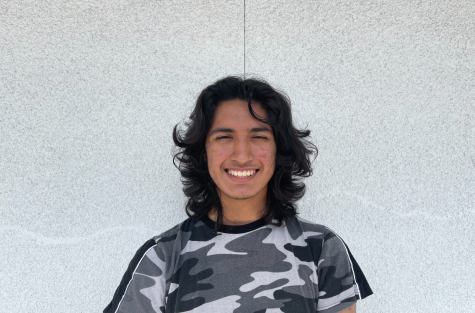
I am a senior at Bonita Vista High School and this is my second year on staff. I joined newspaper in order to achieve my full potential with my writing...
I am a junior at Bonita Vista High, and a second year staff member on the Crusader. I love being able to meet new people, and having conversations with...

